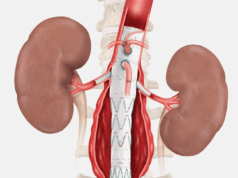 In January 2023, most popular among the Vascular Specialist readers were several stories from the recent Southern Association for Vascular Surgery meeting, including a report of data shared to demonstrate the benefits of vascular involvement in non-vascular-led cases; an update on the use of the Human Acellular Vessel in peripheral arterial disease patients; and two articles centering around interpretations of the BEST-CLI trial data.
In January 2023, most popular among the Vascular Specialist readers were several stories from the recent Southern Association for Vascular Surgery meeting, including a report of data shared to demonstrate the benefits of vascular involvement in non-vascular-led cases; an update on the use of the Human Acellular Vessel in peripheral arterial disease patients; and two articles centering around interpretations of the BEST-CLI trial data.
1. ESVS AAA guidelines alert recommends ‘enhanced surveillance’ in patients treated with Nellix device
The European Society for Vascular Surgery (ESVS) abdominal aortic aneurysm (AAA) guidelines writing committee has published advice that all patients in whom a Nellix (Endologix) device has been implanted “should be identified, properly informed and enrolled in enhanced surveillance.”
2. Envision, private equity and patient care: Substituted values 2.0
Arthur E. Palamara, MD, calls for hospitals to employ anesthesiologists directly rather than via private equity firms, which he believes “consume much” and “yield little”, with a knock-on effect on patient care.
3. SAVS 2023: President reveals upcoming change to Society seal
Southern Association for Vascular Surgery (SAVS) President William D. Jordan Jr., MD, used a portion of his 2023 Presidential Address to outline ways in which SAVS is set to further evolve as a professional body going forward, including a change of seal.
4. SAVS 2023: Study points toward CKD patients who would most benefit from renal artery stenting
A new study probing which chronic kidney disease (CKD) patients would benefit most from renal artery stenting points toward those who experience a more rapid decline in renal function over six months prior to the procedure.
5. SAVS 2023: Planned and unplanned vascular assists found to improve outcomes
An award-winning paper presented at the 2023 Southern Association for Vascular Surgery (SAVS) annual meeting in Rio Grande, Puerto Rico, established an association between vascular involvement in non-vascular-led cases, where vascular expertise was required, and improved patient outcomes.
6. Vascular community starts process of wrestling with findings from BEST-CLI
One of the earliest multispecialty public gatherings of the vascular community following the release of the first results from the BEST-CLI randomized controlled trial (RCT) raised some of the early fault lines developing between different interpretations of the study’s key data.
7. Human-tissue engineered blood vessels remain durable at six years in PAD patients, latest study results show
Mid-term results from a phase II study of surgical bypass using the Human Acellular Vessel (HAV) demonstrated an overall secondary patency rate at 72 months of 60% measured by Kaplan Meier. There was no evidence of graft rejection or infection, the authors reported.
8. Medtronic announces first enrollment in head-to-head global randomized trial evaluating durability of EVAR
Medtronic has announced the first patient enrollment in the ADVANCE trial, a head-to-head randomized controlled trial of two leading aortic stent graft systems, the Medtronic Endurant II/IIs stent graft system and Gore Excluder abdominal aortic aneurysm (AAA) device family systems.
9. BEST-CLI: Analysis finds correlation between WIfI stage four CLTI and reports of poorer mental health
The BEST-CLI dataset has revealed a correlation between wounds, ischemia and foot infection (WIfI) stage and poorer quality of life due to mental, rather than physical, health for patients with chronic limb threatening ischemia (CLTI).
10. SVS Foundation changes name of program aimed at providing care for underserved patients
The Society for Vascular Surgery (SVS) Foundation program formerly known as VISTA has a new name. VISTA—an acronym for Vascular Volunteers In Service To All—is now simply Vascular Care for the Underserved™. Its mission, however, remains the same: “to provide outreach, screening and other resources to those who are impacted by lack of access, inadequate resources and/or distance from modern healthcare facilities.”












